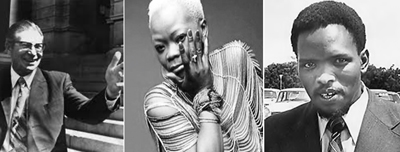Latest News Archive
Please select Category, Year, and then Month to display items
22 May 2020
|
Story Nitha Ramnath
![]()
A Virtual celebration of Africa Month
On 25 May 2020, Africa will celebrate the 57th anniversary of the founding of the Organisation of African Unity. A central tenet of the organisation, which was the predecessor of the African Union, is African solidarity. Member states undertook to coordinate and intensify their cooperation and efforts to achieve a better life for the people of Africa. The University of the Free State (UFS) has a long tradition of commemorating Africa Day and the ideas underpinning it. Every year, diverse events aimed at advancing African unity and solidarity take place during Africa Month – traditionally, the highlight is the Africa Day Memorial Lecture hosted by the University's Centre for Gender and Africa Studies.
This year, celebrating African unity through significant events involving the physical presence of a large number of people, will likely be impossible. COVID-19 is ravaging the world and Africa may become one of the world regions worst affected by the consequences of the virus. Social distancing may be difficult to achieve in a continent with densely populated urban centres that often feature large informal settlements. Besides, the economies of African nations are not as robust as those of other world regions. The challenge that Africa is facing, appears to be one that can only be mastered by its people acting in solidarity and unity. The continent has already developed an Africa Joint Continental Strategy for COVID-19 Outbreak to combat the virus, and an Africa Taskforce for Coronavirus has been established. The ideas of African togetherness and the underpinning philosophy of Ubuntu may be critical for strengthening African solidarity at a time when it may be more relevant than ever.
The commemoration of Africa Day takes a different theme each year. This year, the UFS 2020 Africa Month celebrations will take a virtual format, with the theme of ‘Africa together forever’ underpinned by the COVID-19 global pandemic. The theme is particularly significant considering the context of the African continent; and only through the demonstration of solidarity and unity can Africa overcome the challenges of the global pandemic.
The University will host a variety of cultural and intellectual contributions on the dedicated UFS virtual Africa Month website. On Africa Day (25 May 2020), a virtual Africa Day function, which will be posted on the website, will conclude the Africa Month commemorations.
The diverse contributions to the 2020 virtual Africa Month activities will highlight the University’s commitment towards creating a diverse, challenging intellectual environment. The UFS strives as a research-led university, to provide an environment in which new ideas are incubated and debated; contributing towards its transformation process and African unity.
Understanding the nature of prominence
2014-03-14
|
 |
What did Hendrik Verwoerd and Steve Biko have in common? Or perhaps Johannes Kerkorrel and Brenda Fassie?
“They all possessed a certain natural predisposition to prominence,” says Prof Paul Fouche, reseacher in psychobiography at the University of the Free State’s Department of Psychology.
Prof Fouche and a team of researchers from other South African universities released findings on psychobiographical studies done on personalities that played a great role in our history.
The studies show that notable historical figures were very often prolific readers with a passion for literature since childhood. Generally, they also had a great love for nature and a sense of the sacredness of it, as well as a love for the cosmos.
The study further reveals that many of them were forced to take up leadership roles in the family from a very young age and were driven to succeed in order to take care of their own.
In many of these cases, there was a strong partner who supported the leader while they went about the business of governing their world.
Psychobiography is the systematic and descriptively-rich case study of renowned, enigmatic or even contentious individuals in socio-historical contexts within a psychological frame of reference. Over the past decade, psychobiography has become an established research genre and a methodology used by various academics and scholars in the field of life history research.